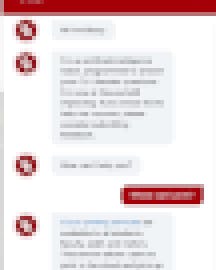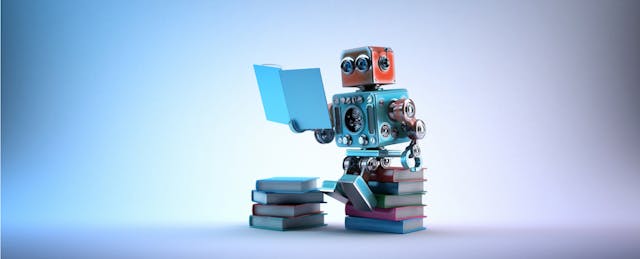The newest librarian at the University of Oklahoma is a robot.
It’s a chatbot, which library officials plan to add to the library’s website this summer to answer some of the most common questions students come in with, as well as to help them get started with their research. The system can tackle things like “where can I print?” or “what databases do you have about biology?” Anything it can’t answer gets sent to a human librarian.
The bot is just one example of how college libraries and technologists are experimenting with artificial intelligence to support students and professors in their research. Algorithms may soon help them prepare their literature reviews by quickly finding the most important papers in an area, and help match researchers with peers in other disciplines doing similar work to form new collaborations.
These AI bots are the latest frontier in the digitization of research tools. Physical card catalogs were long ago taken out of use (and often turned into coffee tables). Many print books have moved to off-site storage facilities to free up space for studying—or to make room for computers that can now access the vast store of information now available online and in subscription databases.
The use of AI in libraries has resurfaced age-old questions, such as whether technology will replace human librarians. But it also raises new issues, such as what blind spots could be created when algorithms play an even greater role in how scholars do their work. And who will have access to the data about what students and scholars are looking for when the librarian is a robot?
“I think it’s possible, and probably inevitable, that these kinds of things will become available and will be challenging to the library profession,” said Steven J. Bell, associate university librarian for research and instructional services at Temple University libraries, when asked about chatbots and other AI in libraries. “In some ways maybe these tools will free us up from having to do a lot of ... very basic things.”
Training the Library Bot
”Hi I’m Bizzy!”

That’s how the University of Oklahoma’s library chatbot greets users. Its name is a nod to the student nickname for the university’s Bizzell Memorial Library.
The library’s website has long offered users the ability to chat with human librarians during certain hours. But officials say the idea for adding the chatbot came from noticing that users had questions at all hours, at times when no one was on hand to answer.
Students “work around the clock, and we needed a way to answer low-level questions around the clock,” says Timothy Smith, interim head of web services for University of Oklahoma libraries.
Officials didn’t build the AI that powers Bizzy. For that, they worked with a commercial vendor that other units on campus had already contracted with, Ivy.ai. For the library, the job was to train the chatbot.
They started by feeding in a long list of frequently asked questions and answers that the university had put together, like when the library is open and where the bathrooms are located. Then they fed in two years worth of logs from the live chat service—so that the system now knows every question that users have asked real librarians through the website during that time, and what the answers were.
The chatbot has been in a test phase for the past six months, and Smith admits it doesn’t always give the right answer. One recurring glitch is when the system misunderstands the question.
Library officials are also training the chatbot to help users do a basic search for a book. Of course, students and other users have long been able to search the catalog on a different part of the website, but Smith says that today’s students want to interact with technology using natural language—so that the request is more like a conversation than filling in a database form.
“They’re not typing out the same searches that we used to,” says Smith. “They’re using human language to say ‘how do I do this?’ And we want to provide those answers in a similar way.”
Taking Things Slow
Officials say they are doing plenty of outreach to librarians and professors to make sure people are comfortable with the system—and realize how limited a use the college plans for it.
“People are worried it’s going to do their job for them,” said Carl Grant, interim dean of libraries. “That’s quite frankly ridiculous at this point and time. But you have to introduce it in a way that [users] can learn that from their own experience.”
And Grant stressed that most of the queries that the chatbot handles are mundane things like when the library opens, rather than serious intellectual questions. “We’ve been very specific that we’re going to put a limit on the complexity of the answers it can take on,” Grant adds. For anything more complicated, the system will “kick it up to humans.” If a student poses a question in the middle of the night that Bizzy can’t answer, a human can send them back an answer once he or she is back on duty.
For now, users have to type questions for the chatbot, but Smith says that officials are working on building a “skill” for Alexa that will let people ask Bizzy questions via one of the Amazon voice assistants.
The goal is to roll out the chatbot soon—sometime this summer. And they expect to refine it over time.
More AI on the Way
The university’s library is also experimenting with other uses of artificial intelligence.
One project aims to help create a match-making service to help professors find collaborators for their research.
Like many universities, Oklahoma hosts a repository of scholarly papers written by its faculty. The university plans to have an AI-powered tool search across the full text of all of those papers to identify instances where scholars in different disciplines might be working on similar ideas. The technique is called “concept extraction.
“A lot of times what you’ll find is there are ways to match professors, and they’ll solve each other’s problems,” says Grant. “We can find people doing similar problems but in different domains.”
For example, one professor on campus was working on trying to determine whether there was pollution in the air in a certain area during the 1800s, though there were not scientific measurements taken at the time. It turned out that another professor familiar with art from the period suggested that paintings from the era might help find the answer.
That example happened before the AI system was developed, through a chance conversation. But library officials hope that concept extraction can lead to other such collaborations.
So far the project is in the early stages, and is still a year away from testing. And Grant hopes that they can eventually search even the commercial collections of research journals, though that will take permission from their publishers.
Refining Searches
At Georgia Tech, Ashok Goel, a computer-science professor who developed a chatbot named Jill Watson that serves as a teaching assistant for some of his courses, is also working on applying AI to research.
One project he is working on is called IBID to help researchers in a certain discipline, called Biologically Inspired Design, make more accurate searches of research papers.
“Suppose there is an engineer who wants to ask, ‘how do I harvest water from fog?’” says Goel. “I can go to Google and ask that and get six million hits that are completely useless. Can you get those six hits of biology papers that let you harvest water from fog even if you’re not an expert? Can you find just that right set of articles that can inspire useful solutions?”
Such tools, he says, could one day help researchers compile literature reviews or more quickly find related research to speed their own work.
Does he worry that such tools could replace scholars, or inadvertently leave out key papers?
“Ultimately it is the human being that is going to harvest water from fog,” he says.


